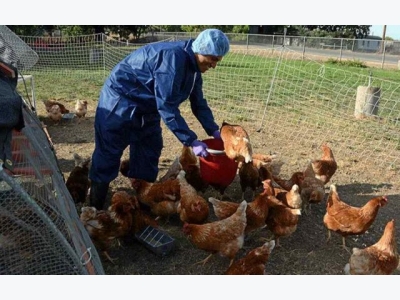Can fly larvae replace synthetic methionine in organic egg systems?

Oscar Martinez, fourth year animal science major feeds hens that are part of UC Davis pastured poultry project. Trina Wood/ UC Davis)
Project to determine if feeding hens a diet supplemented with black soldier fly larvae will cause their eggs to taste or look different.
Pasture-raised chickens like to eat bugs, but does the amount of insects included in their diet have an effect on the eggs they produce? That’s the question University of California-Davis (UC-Davis) researchers have set out to answer with a project to determine if feeding hens a diet supplemented with black soldier fly larvae will cause their eggs to taste or look different.
Currently, certified organic farmers are allowed to add synthetic methionine, an amino acid, to organic poultry feed to improve the birds’ health and egg production. However, the federal National Organic Standards Board has expressed a desire to phase out synthetic methionine from organic poultry feed, according to UC-Davis.
Black soldier fly larvae are a natural source of methionine — an important nutrient for chickens — but other natural replacements haven’t worked out so well, which is why synthetic methionine has remained an approved ingredient for organic poultry feed.
Adding fishmeal to feed has been widely studied, but in North America, when used at the levels needed to balance the dietary amino acids, fishmeal is cost-prohibitive and imparts a fishy taste to the meat and eggs.
UC-Davis researchers will have consumers taste test eggs from chickens that have received feed containing 20%, 15%, 10% or 5% black soldier fly larvae to see if it affects the eating experience.
The larvae are produced in professor Jean VanderGheynst’s lab on campus and are also purchased from commercial sources. The larvae are processed, dried and ground into prepared chicken feeds.
The project may lead to improved poultry health while reducing the amount of corn and soy used in chicken feed. The corn and soy saved could be diverted for other uses, including biofuels and additional calories for people, UC-Davis said.
The experiment is being supported by the Methionine Task Force, which represents organic poultry producers across the U.S.
The collaborative project is led by Maurice Pitesky, University of California Cooperative Extension poultry specialist with the UC-Davis School of Veterinary Medicine and University of California Agriculture & Natural Resources; Deb Niemeier, professor from the department of civil and environmental engineering, and Jean VanderGheynst, professor in the department of biological agricultural engineering.
Related news
 Old bird diseases occur more among free-range hens
Old bird diseases occur more among free-range hens Over the last two decades old bird diseases, such as Coryza, Blackhead and Pasteurelle multocida increasingly reared their ugly heads among free-range hens
 Project to prevent erysipelas in organic poultry
Project to prevent erysipelas in organic poultry A new project that that will enable scientifically based guidelines to prevent future erysipelas outbreaks in both organic poultry and pig production.
 Parasite control can reduce hen mortality
Parasite control can reduce hen mortality A recent PhD study has investigated animal welfare in organic egg production and found an association between hen mortality and the level of parasite infection